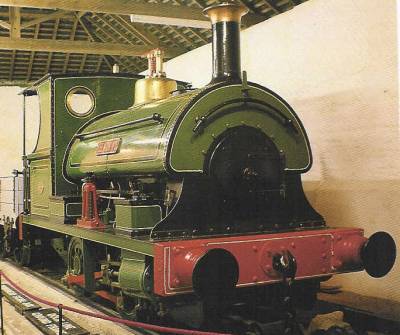| GWR 0-6-0PT 1369 |
Location: Buckfastleigh; in service |
| Boiler Ticket expires: |
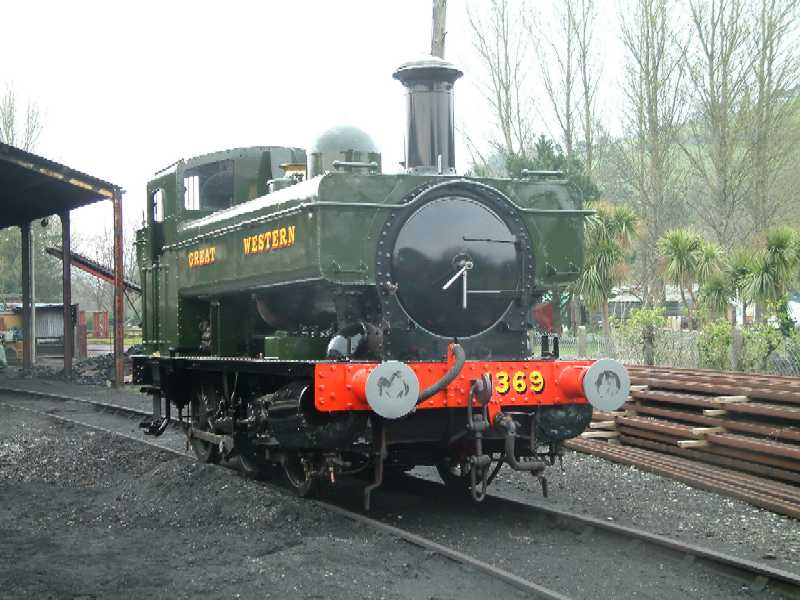 |
The 1366 Class were built for dock shunting to replace ageing Cornwall Mineral Railway locomotives. They kept many of the features of the older locomotives including the Allan straight link valve gear. The seven engines of the 1366 Class (numbered 1366 - 1371) spent most of their careers either at Weymouth where they worked the Quay branch for many years and at Swindon where they were used for shunting the extensive works facilities. In 1962, with replacement at Weymouth Docks by diesels imminent three were transferred to the Wenfordbridge china clay branch in Cornwall. 1369 was one of those so deployed and remained in service there until 1964 when the diesels once again ousted them from their duties. 1369 was saved for preservation and was taken to the South Devon Railway. After many years out of service the engine returned to steam in 1996 after an overhaul costing £40,000. Since then it has travelled to several other railways on charter work. It is a little small for general day to day work on the South Devon Railway but comes into its own on open days and at quieter times of the year. Click here for a history of 1369.
| GWR 0-4-2T 1420 |
Location: Buckfastleigh; out of service |
| Boiler Ticket expires: Expired |
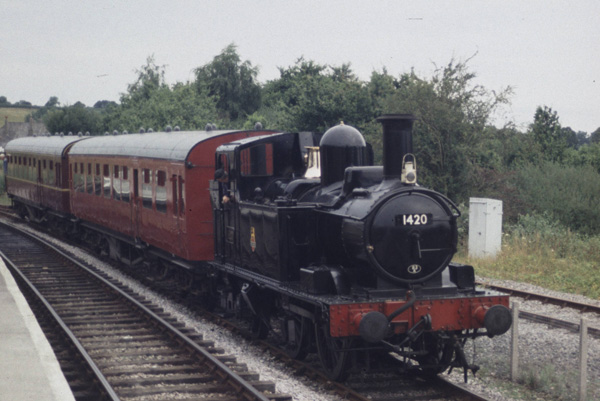 |
The 14XX Class were introduced in 1932 (originally numbered in the 48XX series) 75 were built fitted with 'push-pull' apparatus and a further 20 numbered 5800 to 5819 were built without push-pull control. They were a development of the old 517 Class 0-4-2 tanks built in the 1870s. The push-pull or auto train apparatus enabled the 14XX to work the specially constructed auto coaches (known as trailers) which the Great Western so much favoured for its branch line and some suburban services. The engine could work its train in either direction without the need to run round at stations with the driver using the front cab of the carriage. The South Devon Railway has three Auto-coaches and runs its 14XX locomotive No 1420 with two of these carriages Nos 225 & 228 at times throughout the year. Please see the
to find out if there's an Auto working this month. Please note that 5526, 5542, 6412 and 6430 can also operate Auto Trains.
Three other 14XX locomotives are preserved - 1442 at Tiverton Museum, 1450 is in private ownership and 1466 is kept at the Great Western Society depot at Didcot.
For a drawing and technical specification of the 48xx/14xx GWR 0-4-2T locomotives then click here.
| GWR 0-6-0 3205 |
Location: Buckfastleigh; out of service |
| Boiler Ticket expires: Expired |
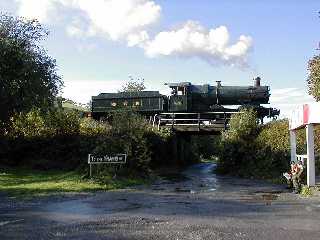 |
Built Swindon 1946. 3205 is one of 120 locomotives of the 2251 Class designed by Collett for use on lightly laid lines in Wales and to replace ageing locomotives from various constituent Companies that were absorbed into the GWR at the 1922 grouping. They were in fact the last design of 0-6-0 tender engines to enter service in the UK. They had fairly large driving wheels at 5'2" diameter and the same boiler that was used on the 9400 Class Pannier tanks.
The 2251 Class also found employment on other lighter duties on the Western Region and 3205 eventually found itself on Somerset & Dorset metals after that section was taken over from the Southern Region. When 3205 was withdrawn from service in 1965 it was bought for preservation by the '2251 Fund' to become the only member of its class to survive. In the first instance it was moved to Buckfastleigh for restoration but went on to the Severn Valley Railway in 1967. It was used there for several years before moving on to the West Somerset Railway for another few years. In 1998 it moved to its present base on the South Devon Railway where it has had to receive attention to a broken crank axle sustained in traffic on the West Somerset Railway just a week before its planned move to Buckfastleigh. (NB Cross reference to
picture) This repair has cost in the region of £14,000 and was the first GWR "Built up axle" to be made in preservation.
3205 returned to traffic on 29
th May 2010 following a heavy general overhaul. For the restoration story click
here.
| GWR 2-8-0 3803 |
Location: Dartmouth Steam Railway Sold February 2022 |
| Boiler Ticket expires: Expired |
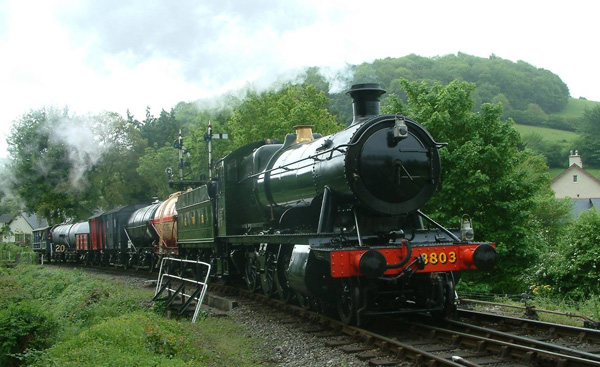 |
In 1903 Churchward introduced the first of his heavy freight 2-8-0's. The first loco, originally numbered 97, later became No.2800. More were built over the coming years until eventually the class numbered 164, including the Collett designed variants (2884 Class). 3803 was one of these later engines and was put in traffic in 1942. The engines, in line with the Great Western scheme of standardisation, used many components common to the larger 4-6-0 types not least of which was the Standard No 1 boiler as used on Stars, Saints, Halls Granges & Modified Halls. These 2-8-0's were highly successful and many lasted right until the end of steam on BR Western Region. 3803's claim to fame was that it took part in the 1948 locomotive exchanges when it was used on the Eastern Region in comparative trials with various LNER designs. It was purchased for preservation in 1984. Although rather large for the South Devon Railway's branch line image it is light enough to be able to work the line. It is expected that it will eventually work as a hire engine with spells at Buckfastleigh between assignments. Limited restoration work was carried out at Birmingham Railway Museum but the engine returned to Buckfastleigh during 1999 where the full restoration was completed in our own workshops.
3803 returned to revenue service in September 2006 and sees use on the heavier trains during the busy season and whenever a "heavy haul" goods train.
No 2818 has been officially preserved as part of the National Collection and is displayed in the National Railway Museum in York. 2857 has been restored on the Severn Valley Railway and 3822 at Didcot (GWS). Several more are under restoration at sites around the country. Apart from 2818 all examples owe their salvation to having been bought for preservation from the scrap yard at Barry.
See also 2873 and 3803’s earlier news page.
On the 4th February 2022 it was announced that both 3803 and 2873 had been sold to the Dartmouth Steam Railway which, as the Paignton and Dartmouth Steam Raiilway was the original destination for these locomotives before the then Dart Valley Railway split the business and sold off the Ashburton Branch to the South Devon Railway.
| GWR 2-6-2T 4160 |
Location: Buckfastleigh; out of service |
| Boiler Ticket expires: Expired |
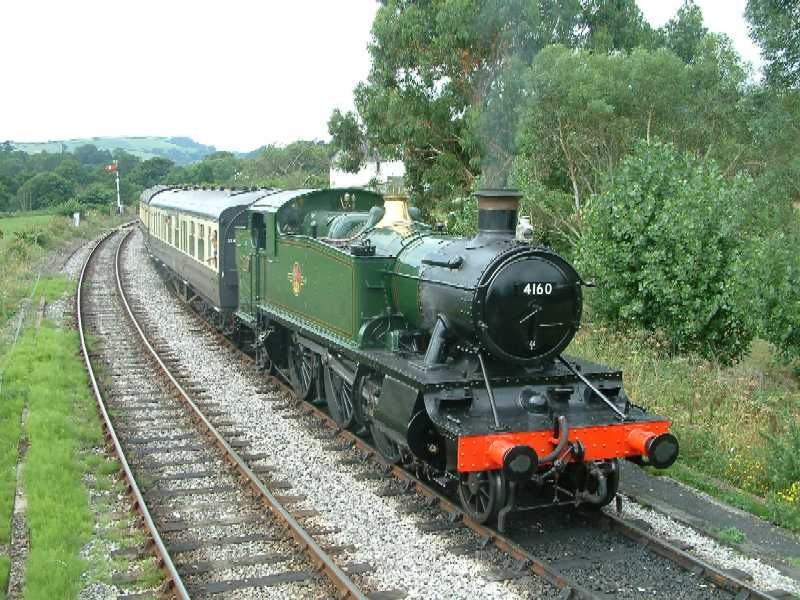 |
GWR Large Prairie 4160 is a BR(W) built locomotive currently at Buckfastleigh awaiting the completion of its latest overhaul and is under the care of 5542 Limited.
| GWR 4-6-0 "Dumbleton Hall" 4920 |
Location: Warner Brothers Studio, Tokyo Japan Sold |
| Boiler Ticket expires: Expired |
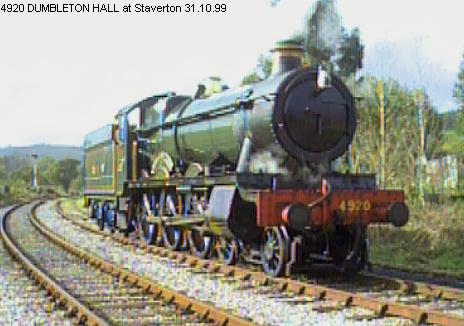 |
Dumbleton Hall was built in 1929, one of the ubiquitous "Hall" class locomotives that eventually numbered 259 plus a further 71 "Modified Halls" The lineage of the "Hall" Class goes right back to the prototype of the Saint Class 4-6-0's from which all the Great Western's series of 4-6-0's were developed. The "Hall" Class were essentially mixed traffic engines and were equally at home on express passenger services and freight. 4920 ended its BR days at Oxford in 1965 when steam was finally replaced on BR Western Region. Its career for the GWR and BR (Western Region) was the longest of any of its sister engines. Its salvation came when it was rescued for preservation from the famous scrap yard at Barry in 1974. Ownership of the engine was vested in a Company called Dumbleton Hall Locomotive Limited This Company achieved Charitable Status and in 1991 took over the running of the South Devon Railway. The Company changed its name to South Devon Railway Trust at that time and now owns many of the assets used to run the line. Meanwhile Dumbleton Hall became a roving ambassador for the South Devon Railway because it is too heavy to operate on the Ashburton Branch. For many years it resided near the workshops at Buckfastleigh awaiting a general overhaul and boiler lift.
There are several more preserved 'Hall' Class engines at locations around the country, the most notable recently being 5972 "Olton Hall" which featured as "Hogwarts Castle" in the film "Harry Potter and the Philosopher's Stone" (Sourcer's Stone in the USA). 4936 "Kinlet Hall" is on the main line (initially with parts on loan from the SDR's 3803). Two members of the 'Modified Hall' Class are operational - 6960 Raveningham Hall at the Gloucester and Warwick Railway, and 6990 Witherslack Hall on the Great Central Railway. Several more of both types are under repair.
In January 2021 4920 “Dumbleton Hall” was sold for an undisclosed sum to a new owner who was reportedly due to restore it to full working order however reports now state it has been cosmettically restored for a Harry Potter ™ experience in Japan along with one and a half BR MkI corridor coaches.
4920 “Dumbleton Hall” left the Railway on Thursday 25th February 2021 by road.
| GWR 2-6-2T 5526 |
Location: Buckfastleigh; in service |
| Boiler Ticket expires: 2027 |
-sml.jpg) |
One of 100 2-6-2 tanks of the 4575 Class introduced by the GWR in 1927. They are slightly enlarged versions of the 4500 Class. The main visual difference between the two types was the larger sloping side tanks which enabled the engines to carry more water giving them a wider range between water stops at the cost of slightly reduced route availability. The 4500 and 4575 classes were favourites for branch line work over most of the G.W. territory. Devon and Cornwall were no exceptions and virtually all the branch lines in the two counties saw engines of one or other of the two types right up until the end of steam, or in many cases, until the closure of the lines in question. The Branch line from Totnes was no exception. Here the 4500 Class were used for the freight traffic. When the line became a private line and speed was limited to 20m.p.h. the larger 4575 Class were permitted. In the early days of preservation engine 4555 was a regular performer on the line and later it was joined by 4588 of the 4575 Class. These two engines are now to be found on the Paignton and Dartmouth Railway. At Buckfastleigh 4575 Class 2-6-2 tank No.5526 passed the million mile mark in March 2011. This engine, built in 1929, was rescued from Barry Scrap yard as were several others of the two versions. In addition to the two at Paignton 4561 is at work on the West Somerset Railway and visited Buckfastleigh during 1997. 4566 works on the Severn Valley Railway. 5572 is at Didcot (G.W. Society) and 5541 on the Dean Forest Railway. Several more are under repair at other sites around the country. Now in preservation, the working examples are proving themselves just as useful as their original owners found them. Click here for
5526 Limited pages.
| GWR 2-6-2T 5542 |
Location: Buckfastleigh; out of service |
| Boiler Ticket expires: Expired |
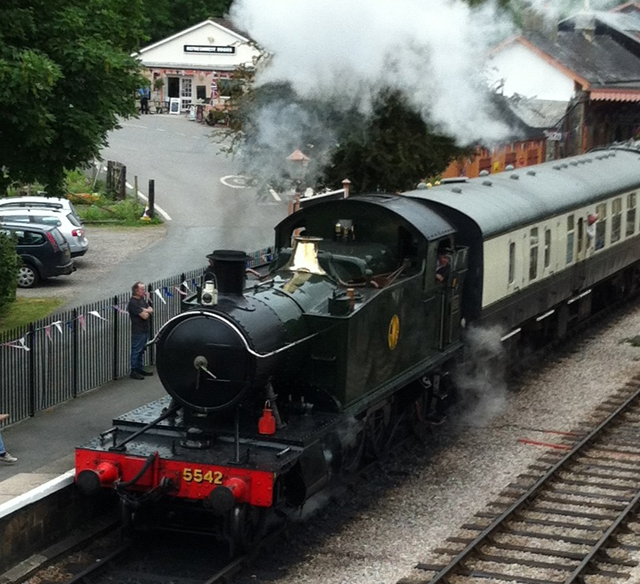 |
Just like 5526, 5542 is another of the 100 2-6-2 tanks of the 4575 Class introduced by the GWR in 1927 and was built in 1928.
5542 was withdrawn by British Railways in December 1961 and then spent the next fourteen years in a scrapyard before being acquired for preservation.
After many years of hard work restoring her she entered traffic on the West Somerset Railway in the autumn of 2002.
She then moved on to work on a number of other heritage lines and her first 10 year boiler overhaul in preservation was carried out by the SDRE Workshops at Buckfastleigh.
On 1st August 2019 5542 Ltd concluded an agreement whereby 5542 will be operated and maintained by the South Devon Railway for the next 30 years.
| GWR 0-6-0PT 5786 |
Location: Buckfastleigh; in service; Livery: BR Black |
| Boiler ticket expires: 31 May 2023
|
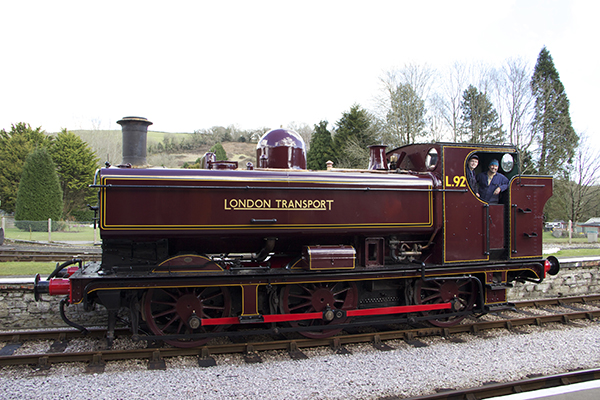 |
The Great Western Railway made much use of its pannier tank designs for shunting, light goods and passenger work. By far the most numerous type was the 57XX Class, of which 5786 is an example. Eventually they numbered 863 and were to be found in almost all corners of the GWR system. They were introduced in 1929 and construction continued at various times until 1949. Slightly smaller versions appeared as the 54XX, 64XX & 74XX classes used for branch passenger and freight; the 16XX were the last in the long line of pannier tanks and were used on light branch line duties. Examples of all these panniers soldiered on almost until the end of steam and many are preserved at various sites around the country. 5786 was one of several sold to London Transport and survived working engineers trains around the LT system as L.92 until the mid-70's. Several more found their way into preservation this way plus some from National Coal Board sites and a few more via the scrap yard at Barry. 5786 was bought by the Worcester Locomotive Society and spent many years at Hereford before that site closed and the Society moved its base to the South Devon Railway. The engine had a major overhaul at Buckfastleigh and is in regular service on the line.
In 2013 the major rebuild of 5786 culminated in it being painted in its former London Transport livery again to the 150 years since the 9th January 1863 when the world’s first underground train pulled out of Paddington station to make the first passenger journey – 3½ miles under the streets of London from Paddington to Farringdon and into the record books.
| GWR 0-6-0PT 6412 |
Location: Buckfastleigh; in service |
| Boiler Ticket expires: 2024 |
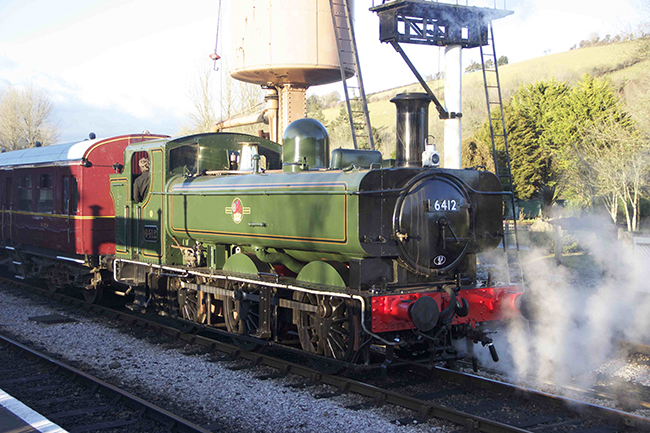 |
The South Devon Railway has been successful in its bid to purchase former GWR locomotives more suited to a quiet branch line but capable of handling the larger trains of a successful preserved railway with the recent acquisition of 0-6-0PT 6412.
6412 is one of the 64xx class of locomotives purchased directly from British Railways by the Dart Valley Railway in 1962 so it never went to near a scrap yard!
For further information on 6412 please read
locomotive page.
| GWR 0-6-0PT 6430 |
Location: Gwilli; in service |
| Boiler Ticket expires: 2025 |
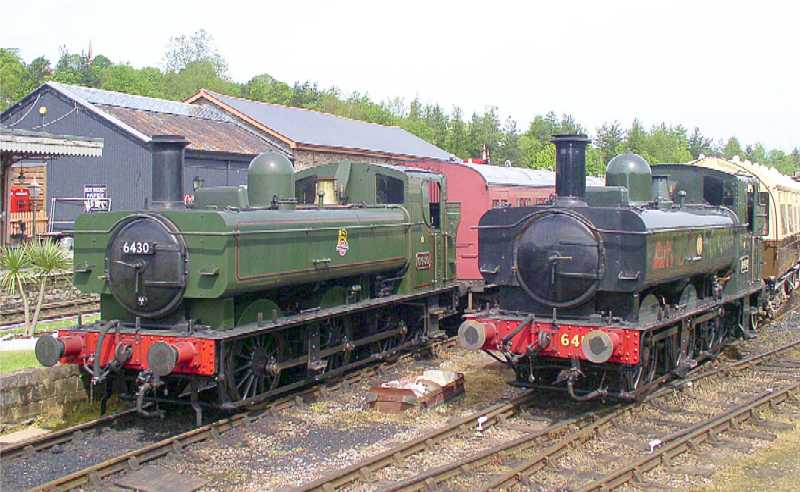 |
6430 was sent to Cashmores of Newport as scrap and was purchased from them by the Dart Valley Railway. Unfortunately whilst the motion was being removed it was shunted damaging the remaining components. 6430 was one three 64xx class of locomotives purchased by the Dart Valley Railway in 1962 and was towed to the Dart Valley Railway by 6412. It was used as spares for 6412 and 6435 and subsequently sold once 6435 had been completed. It was restored at the Llangollen Railway.
6430 is expected to remain on the South Devon Railway for the remainder of its current boiler certificate.
| Peckett 0-4-0ST "Ashley" |
Location: Buckfastleigh out of service |
| Boiler Ticket expires: Expired |
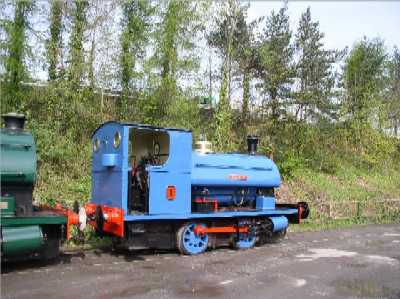 |
Peckett 0-4-0ST used to work at Exeter gas works and came to the South Devon Railway in the early 1970’s and is owned by the South Devon Railway Association.
| Kitson 0-6-0ST Carnarvon |
Location: Buckfastleigh; out of service |
| Boiler Ticket expires: Expired |
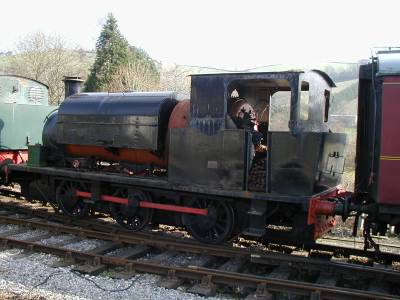 |
Built in 1934 by Kitsons of Leeds to a Manning Wardle design as part of a large order for Stewarts and Lloyds Steel Company, Corby, Northants. Actual numbers of locos built is difficult to ascertain as records are sparse and construction spanned over 50 years. This loco spent all its 35 years of active service on the Corby system, hauling iron ore from the extensive quarries in the area to the blast furnaces, steam locos were phased out in the late sixties on the mineral system.
The Worcester Locomotive Society purchased the loco in working order in the summer of 1969.
Names of Welsh towns were carried by a number of the locos, there being a strong connection with the principality and members of the company board. The name plates were obviously made in England and incorrectly spelt, prompting many comments sometimes rude, from certain quarters.
From Corby the loco was transported by road to Bridgnorth, head quarters of the then embryonic SVR. It spent the winter of 1969/70 on engineering trains. It was also used by Father Christmas as his means of transport at Christmas 1969.
The loco was moved to the Bulmer Railway Centre in the summer of 1970, where it remained until moved to SDR in 1993.
In the early days it was used to give footplate and brake van rides but latterly, as it was not vacuum fitted it was not permitted to do this, however it was used on Members Only days and for the odd goods train.
During the oil fuel crisis of 1973 it was used to shunt the rail borne cider apples every day for two months during the autumn. This resulted in an appearance on National TV under the heading "Steam to the Rescue".
Twenty years on sees it at the SDR where it is undergoing a heavy general overhaul which will include fitting of vacuum brakes so it can work trains on the line.
| GWR 0-6-0ST "Glendower" |
Location: Buckfastleigh; out of service |
| Boiler Ticket expires: Expired |
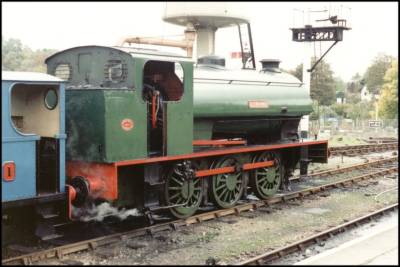 |
Over 80 of these ex-War Department 0-6-0 saddle tanks have been preserved. Many private railways have made extensive use of them on their services over the years. Whilst not the most attractive of engines or indeed the most ideal engine for working a branch line they are rugged and reliable. The South Devon Railway has seen five different examples of these locomotives at work on the line during the past few years. Glendower is currently undergoing overhaul. The engine was originally built for the WD/Ministry of Defence. At the end of the war a batch were sold to the LNER where they were classified J94 and were used for shunting work. Some remained with the Army for all their pre preservation working life but many more were sold to the National Coal Board and sold for preservation from there. Glendower was bought from the Coal Board in South Wales in 1973.
| Peckett 0-4-0ST "Lady Angela" |
Location: Buckfastleigh; out of service |
| Boiler Ticket expires: Expired |
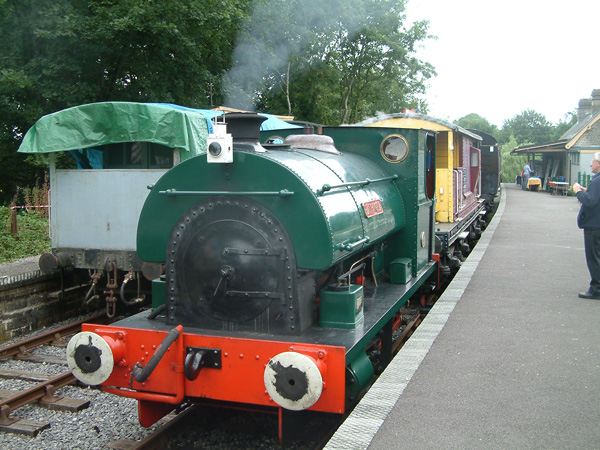 |
Peckett 0-4-0ST "Lady Angela" is privately owned and came to the South Devon Railway in the late 1960s.
| SDR 0-4-0VB “Tiny” |
Location: Buckfastleigh; out of service |
| Boiler Ticket expires: Expired |
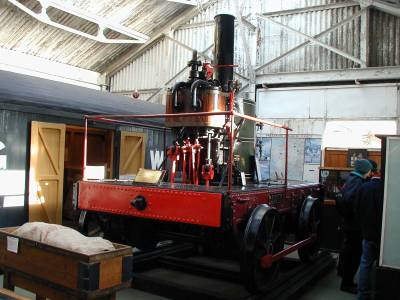 |
“Tiny” is the last surviving original “broad gauge” locomotive built for Brunel’s 7’¼” railway. There are other Broad Gauge locomotives but they are replicas though the GWR “North Star” at Swindon contains parts of the original engine.






-sml.jpg)








